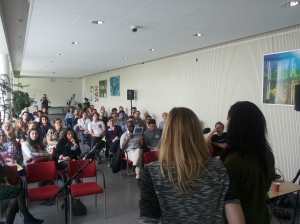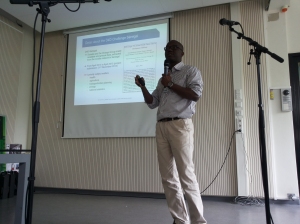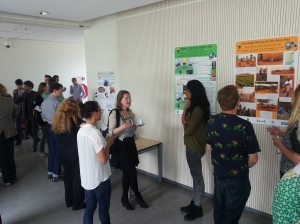 Today, the second international VU symposium in ICT for Development was held. As last year, the workshop was a great success, with an international host of speakers and a variety of attendees (around 80 people joined).This year’s symposium we looked at the opportunities and challenges for “Data for Development” from many angles. In his keynote speech, Gayo Diallo from Unversite de Bordeaux elaborated on how data from mobile telephony providers was used to identify issues with access to health care in Senegal. Marije Geldof discussed the success and difficulties in using mobile data services for assisting health workers in Malawi.
Today, the second international VU symposium in ICT for Development was held. As last year, the workshop was a great success, with an international host of speakers and a variety of attendees (around 80 people joined).This year’s symposium we looked at the opportunities and challenges for “Data for Development” from many angles. In his keynote speech, Gayo Diallo from Unversite de Bordeaux elaborated on how data from mobile telephony providers was used to identify issues with access to health care in Senegal. Marije Geldof discussed the success and difficulties in using mobile data services for assisting health workers in Malawi. After these longer presentations, a series of duo-presentations were held. In the first the concept of upscaling and downscaling (big) data sharing solutions was discussed (Hans Akkermans and Christophe Gueret). In the second duo-presentation we heard from two Amsterdam-based organizations on the use of Open Data for aid transparency (Rolf Kleef) and how to connect data from different mobile projects (Karl Lundfall). The final duo-presentation featured Cheah Waishiang on how to connect to local communities using ICT in Malaysia and Chris van Aart who described the approach of the App-developer. Myrthe van der Wekken and Gossa Lo presented their research on Knowledge Sharing for the Rural Poor through a quick pitch and two very nice posters (see also their reports 1 and 2) .
After these longer presentations, a series of duo-presentations were held. In the first the concept of upscaling and downscaling (big) data sharing solutions was discussed (Hans Akkermans and Christophe Gueret). In the second duo-presentation we heard from two Amsterdam-based organizations on the use of Open Data for aid transparency (Rolf Kleef) and how to connect data from different mobile projects (Karl Lundfall). The final duo-presentation featured Cheah Waishiang on how to connect to local communities using ICT in Malaysia and Chris van Aart who described the approach of the App-developer. Myrthe van der Wekken and Gossa Lo presented their research on Knowledge Sharing for the Rural Poor through a quick pitch and two very nice posters (see also their reports 1 and 2) . All in all, the symposium showed that in every stage of the data value chain, there is progress being made in the development context. However, there are enormous challenges to be overcome at each stage as well. Enough to work on for a next installment of this yearly symposium series. You can watch the entire symposium through the embedded video below (3 hrs). Below the video you can see the list of speakers and the different timestamps in the video when their talk starts (clicking on the link will open in new window).
All in all, the symposium showed that in every stage of the data value chain, there is progress being made in the development context. However, there are enormous challenges to be overcome at each stage as well. Enough to work on for a next installment of this yearly symposium series. You can watch the entire symposium through the embedded video below (3 hrs). Below the video you can see the list of speakers and the different timestamps in the video when their talk starts (clicking on the link will open in new window).
- Gayo Diallo – Université de Bordeaux, Bordeaux, FR “Mobile Data in Senegal, a Health Decision Enabler” (6.58)
- Marije Geldof – ICT4D professional The Hague, NL “‘Mobile health and the role of data in Malawi’” (45.05)
- Hans Akkermans – The Network Institute, VU Amsterdam, NL, “Community-centric Data Services (1.12.00) for Social & Economic Development in Africa”
- Christophe Guéret – DANS-KNAW The Hague, NL “Downscaling the (Semantic) Web: Decentralized Linked Open Data for World Citizens” (1.22.40)
- Rolf Kleef – Open for Change, NL “Open Data for Development Agencies” (2.04.30)
- Karl Lundfall – Text2Change, NL “Integration of Data Sources for Development” (2.15.18)
- Cheah Waishiang – Universiti Malaysia Sarawak, Malaysia “Empowering & knowledge through digital storytelling in Borneo, Sarawak, Malaysia” (2.28.26)
- Chris van Aart – 2CoolMonkeys, Utrecht, NL “Mr. Meteo, Weather forecasts for African farmers” (2.41.30)


